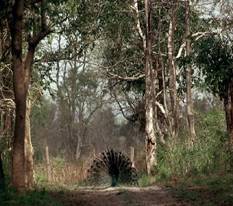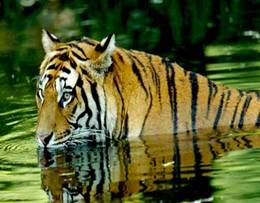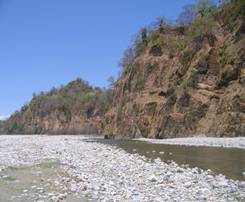INTRODUCTION
The Corbett national park named after Jim Corbett was established in the year 1936 and is also referred as the Hailey National Park. The Corbett Park also takes the credit of India's first national park and the first sanctuary to come under Project Tiger. The Corbett national park on the foothills of the Himalayas spreads over an area of about 201 square mile and is extremely rich in its flora and fauna. With an excellent environment and habitat, the Corbett National park is ideal for wild population of Tigers, Leopards and Elephants.HISTORY
The Jim Corbett National Park was earlier the hunting ground of the British during which the legendary hunter-naturalist turned author and photographer namely Jim Corbett who dedicated most of his life in the development of this park. In the year 1973 the Jim Corbett National Park with the help of World Wildlife Fund got Project Tiger.ORIENTATION
Jim Corbett National Park in the foothills of Himalayas lies in the Nainital, Pauri Garwhal and Bijnore Districts of Uttaranchal.Corbett National Park is located in Ramganga valley in Uttaranchal.It is at a distance of about 263 kilometers from Delhi.BEST TIME TO VISIT
The ideal time to visit this park is anywhere between November to June. The Corbett remains closed from June 15 to November 15.PLACES OF INTERESTS
Flora
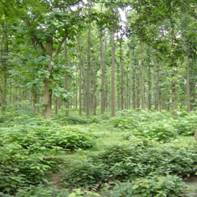
Fauna
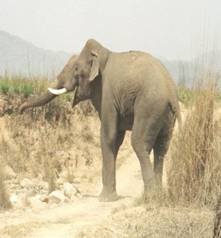
Reptiles
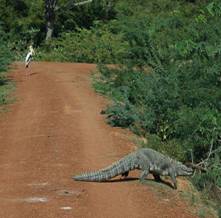
Apart from the fish-eating Gharial Crocodile and the 'Mugger'
Crocodile the Corbett park is also noted for some common reptiles like Monitor Lizards,
Turtles, Cobras, Pythons, Sal forest Tortoise, Russell's viper and kraits.
Avian Species
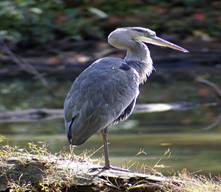
Black throated Payas, Mynas, Kingfishers, migrant Gulls, Kalij Pheasants, Grebes, Grey Lags, Snipes, Harriers, Ospreys, Minivets, Babblers, Hornbills, falcons and Stone Curlews.
Things to do
Tiger Spotting
Tiger Spotting is the most thrilling part of the Corbett National Park. It is said that there are at least 140 tigers in the sanctuary and if you are lucky you will be able to spot one. The rate of success is more during the months of April to mid June. There jeeps and guides to take you around the park. Most of the visitors coming here come with the purpose of seeing tigers in Corbett National Park.Elephant Rides
The Wildlife Safari especially on the elephant back is the most thrilling part of the tour into the Corbett National Park. The experience of sitting high a top an elephant in a teak wood chair is quite cool and is one of the most famous ways to track the tigers.Fishing
Fishing is permitted in Corbett in Ramganga, Kosi, Mandal and Kothari rivers. But you need to take permission before you go fishing. Rods are available on hire. Resorts also arrange fishing and angling trips here. So you can catch fish, and have your own lunch here.Kids Corner In Corbett
There are special 'Earth camps' in Corbett to keep the kids hooked. Started in 2004, the camp aims to bring children closer to particular 'Biomes' to give them first hand experience of nature. The 'Biomes' are specially tailored to match with the requirements of biology curriculums of school going children.Jeep Safari
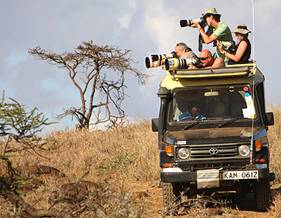
ShoppingThere is nothing much to shop in the Jim Corbett Park. EAT OUTS1.River View Restaurant & Resort 2.Maharaja 3.Bengal Hotel 4.Dolma 5.Tadka Restaurant 6.Gulmohar Restaurant ACCOMMODATION1.Quality Inn The Den 2.Hotel Alka Nainital
3.Pavilion Nainital 4.Chevron Fairhavens Nainital 5.Hotel Arif Castles 6.Hotel New Bharat,Zoo road, |
Travel Guide
Travel Information
| |||||||||||||||||||||||||||||||||||||||
HOW TO REACH
By Air
Khajurao at 230 km is the most convenient airport connected to the park by various domestic airline services with Agra, Delhi, Varanasi.
By Trains
The nearest railhead Umaria at 30 km is on the Katni-Bilaspur section of South-Eastern Railway. Another convenient railhead Satna (117 km) is on the Bombay-Howrah main line of the Central Railway.
By Road
Bandhavgarh National Park is situated on the Satna-Umaria & Rewa-Umaria highway. Madhya Pradesh State Transport Bus Services are also available from Rewa, Satna, Katni and Umaria.
- Send your feedback / Change Request by using this link.
- List your Hotel / Travel Agency with Photos in this web page .



